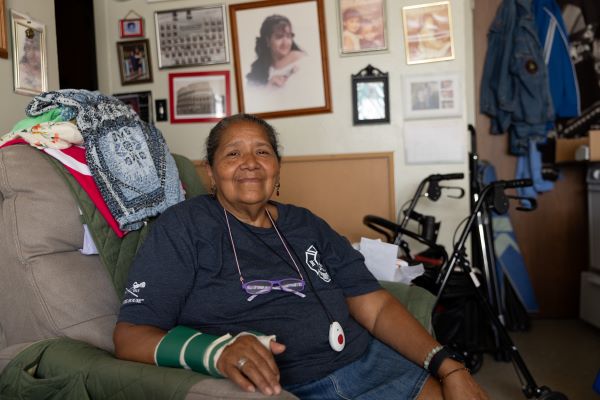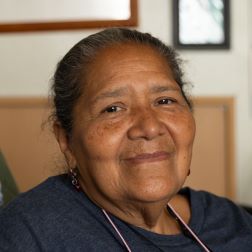
It’s a help to me because I can’t be there all the time.
“Wherever I am, I’m happy,” says Anita. Though, after nearly 50 years in the same apartment, it's hard to imagine being anywhere else. Anita was just seven years old when she and her family moved to New York from Ecuador. She’s lived in Chelsea ever since. “My life is here,” she says.
Anita raised two children in this apartment — a son and a daughter. The living room walls are covered in family photos. On the side table next to her armchair is an unfinished sewing project, one Anita had to abandon due to a flare up of her arthritis. “I used to sew,” says the 71-year-old. “I miss sewing. With one and a half hands, you can’t really do it.”
In addition to her arthritis, Anita also suffers from inflammation in her elbow. “I’m not able to use my fingers and it hurts when I use my walker,” she says. She relies on a home health aide to help her with daily tasks that are simply too painful to do on her own. “Sometimes, the home attendant has an appointment, but I know I can count on meals on wheels.”
Anita has been receiving home-delivered meals for five years now. “It’s a help to me because I can’t be there all the time,” says her daughter, Gaby. “It’s a big help. And she’s so picky, I’m glad that she actually likes it,” she adds with a laugh. Anita especially likes that she can choose Latin-style meals. They remind her of the food her parents made when she was growing up.
Back then, they struggled to find specialty ingredients at the corner store. Now, while they’re more easily available, prices are higher than ever. To help save money, Anita grows herbs on her apartment’s windowsill. “I like plants,” she says. She has other ways to cut costs, too. Anita knows the most reasonable grocery stores to hit and isn’t shy about visiting the local food pantries. “People are embarrassed sometimes,” she says. “There’s no reason to be embarrassed.”
While the amount of money she receives from SNAP — the Supplemental Nutrition Assistance Program — is negligible, she knows it’s not the same for some of her neighbors. For them, losing that money is devastating. “It’s hard, some of the cutbacks,” she says. “We need our programs. Not only in our community, but many others like ours.”


